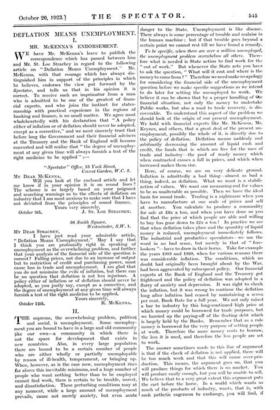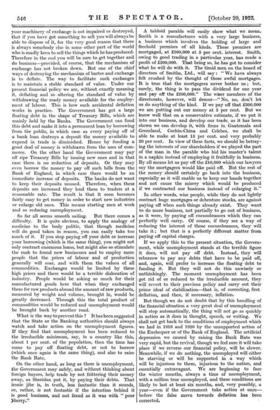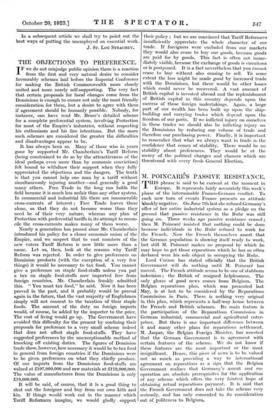DEFLATION MEANS UNEMPLOYMENT.
I.
• MR. McKENNA'S ENDORSEMENT.
WE have Mr. McKenna's leave to publish the correspondence which has passed between him and Mr. St. Loe Strachey in regard to the following article on " Deflation Means Unemployment." Mr.
McKenna, with that courage which has always dis- tinguished him in support of the principles in which he believes, endorses the view put forward by the Spectator, and tells us that in his opinion it is correct. To receive such an imprimatur from a man who is admitted to be one of the greatest of finan- cial experts, and who joins the instinct for states- manship with practical experience in the regions of banking and finance, is no small matter. We agree most wholeheartedly with his declaration that " A policy either of inflation or of deflation should never be adopted, except as a corrective," and we most sincerely trust that before long the Government and their financial advisers at the Treasury and the Bank of England will become converted and will realize that " the degree of unemploy- ment at any given time will always furnish a test of the right medicine to be applied " "Spectator" Office, 13 York Street, Covent Garden, W.C. 2.
MY DEAR MCKENNA,
Will you look at the enclosed article and let me know if in your opinion it is on sound lines ? The scheme is so largely based on your poignant and searching warnings as to the effects of deflation on industry that I am most anxious to make sure that I have not deviated from the principles of sound finance.
Yours very sincerely, October 9th. J. ST. LOE STRACHEY.
86 Smith Square, Westminster, S. W. 1.
MY DEAR STRACHEY,
I have just read your admirable article, " Deflation Means Unemployment." May I say that I think you are profoundly right in speaking of unemployment as the overwhelming problem, and further that your analysis of the financial side of the question is correct? Falling prices, not due to an increase of output but to restriction of credit and purchasing power, must cause loss in trade and unemployment. I am glad that you do not minimize the evils of inflation, but there can be no question that deflation is not less injurious. A policy either of inflation or of deflation should never be adopted, as you justly say, except as a corrective, and the degree of unemployment at any given time will always furnish a test of the right medicine to be applied. Yours sincerely, October 12th. R. MCKENNA.
II.
THE supreme, the overwhelming problem, political and social, is unemployment. Some unemploy- ment you are bound to have in a large and old community like our own—a community in which there is not the space for development that exists in new countries. Also, in every large population there are bound to be a certain number of people who are either wholly or partially unemployable by reason of ill-health, temperament, or bringing up. When, however, as is the case now, unemployment rises far above this inevitable minimum, and a huge number of 'people who want nothing better than to be employed cannot find work, there is certain to be trouble, unrest, and dissatisfaction. These perturbing conditions may at any moment, while a large amount of unemployment pre'vails,- cause not merely anxiety, but even acute danger to the State. Unemployment is like disease. There always is some percentage of trouble and malaise in the human machine ; but if that trouble goes beyond a certain point we cannot rest till we have found a remedy. To be specific, when there are over a million unemployed, the unemployment problem overwhelms all others. There- fore what is needed is State action to find work for thz " out of work." But whenever the State acts you have to ask the question, " What will it cost and where is the money to come from ? " Therefore we need make no apology for considering the financial side of the unemployment question before we make specific suggestions as we intend to do later for setting the unemployed to work. We believe it can be shown that by a proper handling of t+Ie financial situation, not only the money to undertake Public works, but also a road to trade recovery, is dis- coverable. To understand this aspect' of the problem we should look at the origin of our present unemployment. We hold with financial experts like Mr. McKenna, Mr. Keynes, and others, that a great deal of the present un- employment, possibly the whole of it, is directly due to the policy of deflation. Deflation means suddenly and arbitrarily decreasing the amount of liquid cash and credit, the funds that is which arc free for the uses of trade and industry—the pool of ready money which when contracted causes a fall in prices, and which when increased makes than rise.
Here, of course, we arc on very delicate ground. Inflation is admittedly a bad thing—almost as bad a thing, indeed, as deflation. What we want is a stabili- zation of values. We want our measuring-rod for values to be as unalterable as possible. Then we have the ideal basis for sound trade. Trading is a nightmare when you have to manufacture at one scale of prices and sell at another. You calculate to produce a commodity for sale at £.8x a ton, and when you have done so you find that the price at which people are able and willing to buy has gone down to £2x a ton ! In practice we see that when deflation takes place and the quantity of liquid money is reduced, unemployment immediately follows. The industrial and productive speculators—we use the word in no bad sense, but merely in that of " fore- lookers "—have to draw in their horns. Take for example the years 1919 and 1920, when for various reasons there was considerable inflation. The conditions, which no doubt had originally been brought about by the War, had been aggravated by subsequent policy. Our financial experts at the Bank of England and the Treasury got frightened and the policy of deflation was adopted in a flurry of anxiety and depression. It was right to check the inflation, but it was wrong to continue the deflation long after inflation had ceased by maintaining a seven per cent. Bank Rate for a full year. We not only raised a bar to industry by this long-continued high price at which money could be borrowed for trade purposes, but we hurried up the paying-off of the floating debt which is largely held by the Banks. Remember that as a rule money is borrowed for the very purpose of setting people at work. Therefore the more money costs to borrow, the less it is used, and therefore the less people are set to work.
The answer sometimes made to this line of argument is that if the check of deflation is not applied, there will be too much work and that this will cause over-pro- duction. This means, the argument goes on, that you will produce things for which there is no market. You will produce easily enough, but you will be unable to sell. We believe that to a very great extent this argument puts the cart before the horse. In a world which wants so much of the products of industry, wants, that is, with such pathetic eagerness to exchange, you will find, if your machinery of exchange is not impaired or destroyed, that if you have got something to sell you will always be able to dispose of it, for the very good reason that there is always somebody else in some other part of the world who is madly keen to sell the things which he has produced. Therefore in the end you will be sure to get together and do business—provided, of course, that the mechanism of exchange has not broken down. But one of the chief ways of destroying the mechanism of barter and exchange is to deflate. The way to facilitate such exchanges is to maintain a stable standard of value. Under our present financial policy we are, without exactly meaning it, deflating and so altering the standard of value by withdrawing the ready money available for the employ- ment of labour. This is how such accidental deflation works in practice. The Government has got a large floating debt in the shape of Treasury Bills, which are mainly held by the Banks. The Government can fund this debt and make it into a permanent loan by borrowing from the public, in which case as every paying off of a bank loan destroys a deposit the money available to expend in trade is diminished. Hence by funding a good deal of money is withdrawn from the uses of com- merce. On the other hand the Government may pay off ripe Treasury Bills by issuing new ones and in that case there is no reduction of deposits. Or they may even borrow the money to pay off such bills from the Bank of England, in which case there would be an immediate increase of deposits. The banks do not want to keep their deposits unused. Therefore, when these deposits are increased they lend them to traders at a reasonable rate. The result is that it soon becomes fairly easy to get money in order to start new industries or enlarge old ones. This means starting men at work and so reducing unemployment.
So far all seems smooth sailing. But there comes a difficulty. It is quite obvious, to apply the analogy of medicine to the body politic, that though medicine will do good taken in reason, you can easily take too much of it. If you stop paying off your debt or increase your borrowing (which is the same thing), you might not only contract enormous loans, but might also so stimulate the rush to found new businesses and to employ more people that the prices of labour and of production generally will soar, and with them the values of all commodities. Exchanges would be limited by these high prices and there would be a terrible dislocation of industry. People would be asking so much for their manufactured goods here that when they exchanged them for raw products abroad the amount of raw products, measured by weight and volume, brought in, would be greatly decreased. Through this the total product of commodities would be reduced and unemployment would be brought back by another road.
What is the way to prevent this ? It has been suggested that the State or the Banking authorities should always watch and take action on the unemployment figures. If they find that unemployment has been reduced to the irreducible minimum, say, in a country like this, about 1 per cent. of the population, then the time has come to pay off floating debt, or not to borrow (which once again is the same thing), and also to raise the Bank Rate.
On the other hand, as long as there is unemployment, the Government may safely, and without thinking about foreign buyers, help trade by not frittering their money away, as Sheridan put it, by paying their debts. That ironic jibe is, in truth, less fantastic than it sounds, or, rather, is not fantastic if the intention behind it is good business, and not fraud as it was with " poor
Sherry.'!
A tabloid parable will easily show what we mean. Smith is a manufacturer with a very large business, a business which involves the holding of large and freehold - premises of all kinds. These premises are mortgaged, at £200,000 at 5 per cent. interest. Smith, owing to good trading in a particular year, has made a profit of £200,000. That being so, he has got to consider what he will do with it. The.timid men on the board of directors of Smiths, Ltd., will say : " We have always felt crushed by the thought of those awful mortgages. It is true that the mortgagees never bother us ; but, surely, the thing is to pass the dividend for one year and pay off the £200,000." The wiser members of the directorate, however, will demur—" No, no, don't let us do anything of the kind. If we pay off that £200,000 we are putting out our money at 5 per cent. But we know well that on a conservative estimate, if we put it into our business, and develop our trade, as it has been shown we can develop it, with firms in Guatemala and Greenland, Cochin-China and Celebes, we shall be able to make at least 15 per cent. and very probably 20 per cent. In view of these facts, we should be betray- ing the interests of our shareholders if we played the part of the man in the parable who hid his master's talent in a napkin instead of employing it fruitfully in. business. By all means let us pay off the £10,000 which our lawyers say the mortgagees would like paid off. But the rest of the money should certainly go back into the business, especially as it will enable us to keep our hands together and not cause the misery which would be produced if we contracted our business instead of enlarging it."
In other words, wise people, while they do not lightly contract huge mortgages or debenture stocks, are against paying off when such things already exist. They want to do more business, not partially to go out of business, as it were, by paying off encumbrances which they can perfectly well .carry. Of course, if they see a way of reducing the interest of those encumbrances, they will take it ; but that is a perfectly different matter from paying off capital charges.
If we apply this to the present situation, the Govern- ment, while unemployment stands at the terrible figure it does, will not pay off debt. Instead, they will reborrow to pay any debts that have to be paid off, and, again, will prefer to increase the floating debt to funding it. But they will not do this unwisely or unthinkingly. The moment unemployment has been got rid of or reduced to the irreducible amount, they will revert to their previous policy and carry out their prime ideal of stabilization—that is, of correcting, first deflation., and then, if necessary, inflation.
But though we do not doubt that by this handling of the financial situation a very great deal of unemployment will stop automatically, the thing will not go as quickly in action as it does in thought, speech, or writing. We shall not get back to the conditions of employment which we had in 1919 and 1920 by the unsupported action of the Exchequer or of the Bank of England. The artificial depression we caused by raising the Bank Rate was very rapid, but the revival, though we feel sure it will take place if we reverse our financial policy, will be slower. Meanwhile, if we do nothing, the unemployed will either be starving or will be supported in a way which will be injurious to them, injurious to the nation, and essentially extravagant. We are beginning to face the winter months, always a time of unemployment, with a million true unemployed, and these conditions are likely to last at least six months, and, very possibly, a year—even if the Government take action at once— before the false move towards deflation has been
corrected.
In a subsequent article we shall try to point out the best ways of putting the unemployed on essential work.
J. ST. LOE STRACHEY.












































 Previous page
Previous page